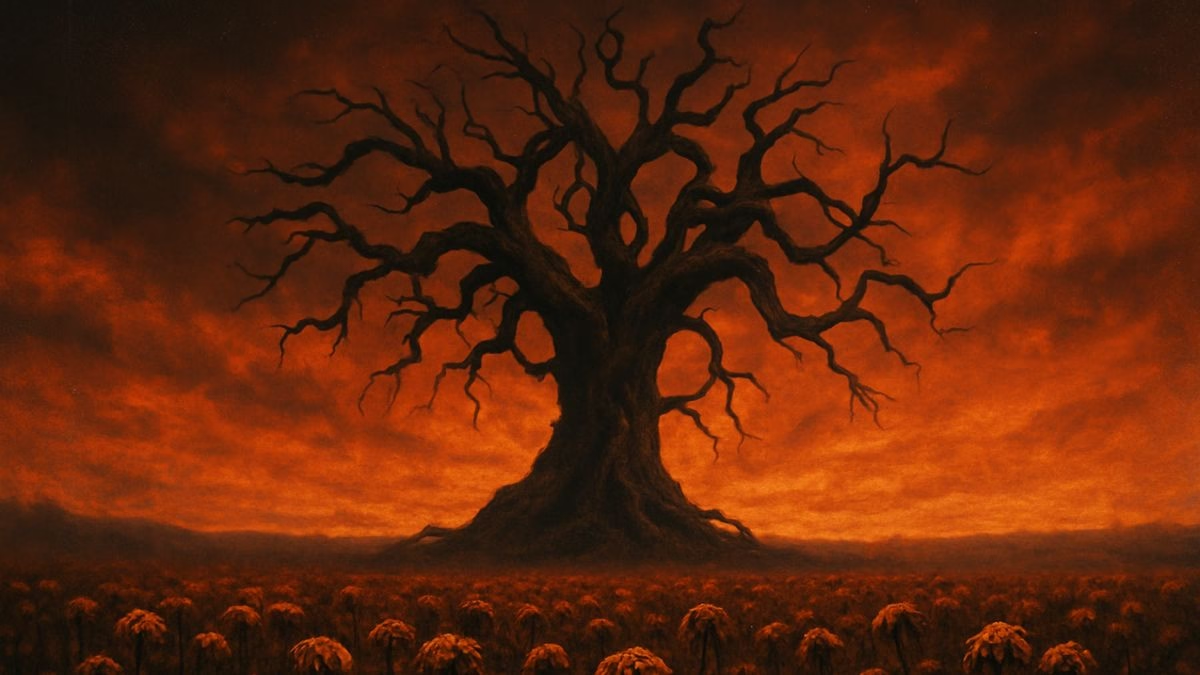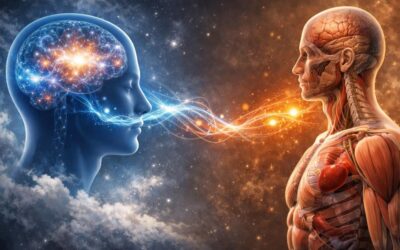Have you ever looked at the world and wondered how profound goodness and gut-wrenching evil can coexist? If God is good, why is there cancer? If God is all-powerful, why are there wars? This episode isn’t about easy answers. Instead, we’re stepping into the cosmic courtroom to wrestle with the age-old philosophical quandary known as the Problem of Evil. We’ll explore the brilliant (and sometimes frustrating) defenses from thinkers like Augustine and Irenaeus, from the idea of free will to the concept of a “soul-making” universe. This is a journey into one of life’s deepest questions, designed not to solve the puzzle, but to give you the tools to reflect on it, find your own perspective, and perhaps, see the cracks in our world not as flaws, but as opportunities for light to get in.
The Divine Dilemma: Wrestling with the Problem of Evil
Have you ever looked at the world, at a devastating headline, at a personal tragedy, and just asked… why? Why do terrible things happen, especially to good people? It’s a question that echoes in the quiet moments of grief and the loud moments of global crisis. It’s a question that can shake the foundations of faith, or build them up stronger. This very question lies at the heart of one of philosophy’s most profound and enduring challenges: the Problem of Evil. It’s a puzzle that has kept theologians, philosophers, and everyday people like you and me up at night for millennia, trying to reconcile the image of a perfect, loving creator with the often-imperfect, painful reality of our existence.
The Ancient Greek Who Threw Down the Gauntlet
Let’s rewind the clock. Way back. We’re talking ancient Greece. Picture a philosopher named Epicurus, probably chilling in his garden, pondering the nature of happiness. But he couldn’t ignore the flip side: suffering. And he framed the problem so perfectly, so devastatingly, that we’re still using his logic today. It goes something like this, often called the Epicurean paradox or the trilemma:
Is God willing to prevent evil, but not able? Then he is not omnipotent.
Is he able, but not willing? Then he is malevolent.
Is he both able and willing? Then whence cometh evil?
Is he neither able nor willing? Then why call him God?
Boom. Epicurus just dropped the philosophical mic, and it’s been echoing for over two thousand years. He basically sets up a cosmic courtroom. In the defendant’s chair is the classical concept of God—a being who is all-powerful (omnipotent), all-knowing (omniscient), and all-good (omnibenevolent). And the evidence against this being? Well, just look around. Earthquakes, diseases, war, cruelty, heartbreak. The prosecution, led by Epicurus, rests its case. The existence of evil seems to be Exhibit A in the argument that such a God cannot possibly exist. It’s a logical checkmate… or is it?
Stepping into the Cosmic Courtroom: The Theodicies
Now, you can’t just leave a challenge like that hanging in the air. Over the centuries, some of the most brilliant minds in history have stepped up to act as God’s defense attorneys. Their arguments are called “theodicies”—a fancy term from the Greek words for “God” and “justice.” A theodicy is an attempt to justify God, to show how the existence of both God and evil is logically possible.
Think of this not as a dry, academic debate, but as a high-stakes trial about the very nature of our universe. The verdict has implications for everything: our sense of purpose, our response to suffering, and the meaning we find in our lives. So let’s hear from the first two major defense attorneys.
Defense Attorney #1: Augustine and God’s Ultimate Alibi
First up to the stand is one of the heavyweights of Christian philosophy, Augustine of Hippo. He lived in the 4th and 5th centuries, a time of great upheaval as the Roman Empire was crumbling. He saw plenty of evil, and he thought about it. A lot. His defense is so influential that it’s become the default answer for many. It’s called the Free Will Defense.
Augustine’s argument is elegant. He starts by saying God, in His infinite goodness, created a perfect world. But the greatest gift He gave His most complex creations—angels and humans—was free will. The ability to choose. Why? Because love that isn’t chosen isn’t really love. Obedience that isn’t voluntary isn’t really virtue. For goodness to be meaningful, we have to have the genuine option to choose its opposite.
So, where did evil come from? Augustine’s genius move is to argue that evil isn’t a thing. It’s not a substance or a force that God created. You can’t have a bucket of evil. Instead, evil is a privation. It’s a lack of good, a corruption of the good that was originally there.
Think of it like this: what is darkness? Darkness isn’t a “thing” in itself; it’s simply the absence of light. What is a hole in a piece of cloth? It’s not made of some special “hole material”; it’s the absence of cloth. What is sickness? It’s the absence of health. For Augustine, evil is the same. It’s what happens when a free being turns away from the ultimate good, which is God. It’s a wound in the fabric of creation, a shadow cast by our own choices.
So, in Augustine’s view, God didn’t create evil. He created the possibility of evil by giving us free will, and he did that because free will is a necessary condition for the highest possible good: freely chosen love and relationship. The blame for evil, then, falls squarely on the shoulders of creation—angels who fell, humans who disobeyed—not on the creator. It’s a powerful, tidy argument. God is off the hook. Case closed, right?
The Hole in the Argument (And We’re Not Talking About Cloth)
Well, not so fast. The prosecution has some follow-up questions. The Free Will Defense is pretty good at explaining what we call “moral evil”—the bad stuff humans do to each other. Murder, theft, betrayal… you can trace those back to a person’s choice.
But what about “natural evil”? What about the Lisbon earthquake of 1755 that killed tens of thousands on a holy day, while they were in church? What about the tsunami that swept away whole towns? What about a child born with a painful, terminal genetic disease? Who chose that? You can’t blame that on human free will.
Augustine had an answer for this, too, though it’s one that many people find less convincing today. He argued that all of creation was corrupted by the original “Fall” of Adam and Eve. Their choice didn’t just affect them; it threw the entire natural world into disarray, introducing death, decay, and disaster. So, even natural evil is an indirect consequence of moral evil.
For many, this feels like a stretch. It asks us to accept a very specific theological story. And more pointedly, it can feel deeply unsatisfying. To tell the parents of a child suffering from leukemia that their child’s pain is a distant echo of a mythological ancestor’s mistake… well, it doesn’t just fail to comfort; it can feel like an insult to their grief. The neatness of the logic shatters against the raw, jagged edge of real suffering.
Defense Attorney #2: Irenaeus’s Soul-Making Gym
So, the jury is still out. Let’s call our second witness. His name is Irenaeus, a bishop who lived even earlier than Augustine, in the 2nd century. He offers a radically different, and for many modern people, a much more resonant defense. It’s often called the Soul-Making Theodicy.
Where Augustine saw the world as a perfect creation that was broken, Irenaeus saw the world as an unfinished creation. We weren’t created as perfect beings who then fell. We were created as immature beings with the potential for perfection, and we are placed in a world designed to help us grow into it.
Think of the world not as a paradise lost, but as a kind of cosmic gymnasium or a spiritual boot camp. The challenges, the struggles, the hardships, even the evils we face, are the weights we need to lift to build our spiritual muscles. You don’t develop courage without facing fear. You don’t develop compassion without witnessing suffering. You don’t develop resilience without overcoming obstacles.
In this view, God isn’t a negligent parent who let his kids break their perfect toy. He’s more like a wise and loving coach who knows that true strength doesn’t come from a life of ease. He allows the world to contain real dangers and real opportunities for failure because that’s the only environment in which we can freely grow into the “likeness of God”—beings of profound love, wisdom, and compassion.
This perspective changes everything. Evil is no longer a pointless glitch in the system. It’s repurposed. It becomes part of the machinery of our own development. The pain is real, the suffering is terrible, but it’s not meaningless. It’s the grit that polishes the soul. It’s the fire that forges the steel of our character. It’s a profoundly hopeful and forward-looking vision. It resonates with our own experiences of post-traumatic growth, of finding strength we never knew we had in the face of adversity.
But Is the Workout Worth the Pain?
This soul-making idea feels good, right? It feels active, purposeful. It gives us a role to play. But again, the prosecution isn’t satisfied. It points to what philosophers call “gratuitous evil.”
Okay, maybe some suffering builds character. Losing a job might teach you resilience. A difficult breakup might teach you about your own emotional needs. But what soul-making purpose is served by a fawn burning to death, terrified and alone, in a forest fire started by lightning? What moral lesson is being taught to an infant dying of starvation?
The sheer scale and horror of some suffering seems to dwarf any possible lesson we could learn from it. The Holocaust. The Rwandan genocide. The quiet, hidden agony of a single person being tortured in a basement. To suggest that these are all just part of God’s cosmic character-building program can feel monstrous. It can make God seem less like a loving coach and more like a cruel puppet master who is willing to inflict unspeakable agony for some far-off, abstract goal.
The philosopher William Rowe put it starkly with his fawn example. He argued that it seems overwhelmingly likely that there exists at least one instance of intense suffering which an omnipotent, omniscient being could have prevented without thereby losing some greater good or permitting some evil equally bad or worse. If even one such instance of pointless, gratuitous suffering exists, then the all-good, all-powerful God of classical theism cannot. The soul-making defense stumbles on the sheer, horrifying excess of evil in the world.
Stepping Outside the Courtroom for a Moment
And this is where we hit a wall. Both of these brilliant theodicies, the Free Will Defense and the Soul-Making Theodicy, provide powerful ways of thinking. They have brought comfort and intellectual stability to millions. But for many, they fall short when confronted with the most extreme examples of evil and suffering.
So maybe… maybe the premise is wrong. Maybe trying to “solve” the Problem of Evil like a math equation is the wrong approach. Maybe we’re not meant to be lawyers proving God’s innocence.
What if we step outside the theological framework for a second? From a purely secular, biological perspective, what we call “evil” isn’t a metaphysical problem. The earthquake is just plate tectonics, a morally neutral geological process. The cancer is just cell division gone haywire, a biological misstep. The lion that kills the zebra isn’t evil; it’s just hungry. Nature is indifferent. It operates on principles of physics and biology, not morality.
And what about human cruelty? A psychologist might point to trauma and brain chemistry. A sociologist might point to systems of power, poverty, and oppression. An evolutionary biologist might talk about tribalism and resource competition being hardwired into our DNA. In this view, evil isn’t a cosmic puzzle to be solved, but a series of complex, multi-faceted human and natural problems to be managed, mitigated, and, where possible, overcome.
This doesn’t make the pain go away. But it reframes the question. Instead of asking “Why would God allow this?” it asks, “Given the reality of our biology and the indifference of the universe, how can we build systems that promote compassion and reduce suffering?” It’s a shift from explanation to action.
The Art of the Broken Pieces
But let’s not leave it there, in a cold, indifferent universe. Because whether you believe in a divine plan or a random cosmos, we are still left with the same reality: life is a mix of breathtaking beauty and heartbreaking pain. The question for us, the living, breathing people in the middle of it all, is how do we respond?
There is a beautiful Japanese art form called Kintsugi. When a piece of pottery breaks, they don’t throw it away. They meticulously put it back together using a lacquer mixed with powdered gold. The philosophy behind it is that the piece is more beautiful for having been broken. The cracks are not something to hide; they are part of the object’s history, and they are illuminated in gold.
Maybe this is the most powerful response to the Problem of Evil. Maybe it’s not about finding a perfect, unbroken explanation for why the pot shattered. Maybe it’s about what we do with the pieces.
The evil in the world, the suffering, the breaks, the cracks in our lives and in our societies—they are real. They hurt. And we can spend our whole lives demanding to know why the potter allowed it to break. Or, we can pick up the pieces. We can apply the gold. The gold is our compassion. It’s our resilience. It’s our courage. It’s the love we pour into the broken places. It’s the communities we build to support the suffering. It’s the art we create out of our pain. It’s the scientific discoveries we make to cure the diseases.
The world is not more beautiful because of evil, but its beauty can be profoundly deepened by our response to evil. A person who has known deep loss can offer a unique and powerful form of empathy. A society that has confronted a great injustice can build a fiercer commitment to justice. The crack doesn’t create the gold, but it creates the space for the gold to be laid.
Your Verdict, Your Universe
So we’re back where we started, looking at this beautiful, terrible, confusing world. We haven’t “solved” the Problem of Evil. And I think anyone who tells you they have is selling you something. It is, perhaps, a problem that is not meant to be solved, but to be lived.
It forces us to confront our deepest assumptions about the world. Is the universe a friendly place guided by a loving hand, where suffering is ultimately redeemed? Is it a soul-making gym where we are forged in fire? Or is it an indifferent cosmos where the only source of light and warmth is what we create for each other?
There isn’t a right answer in the back of the book. The answer is the one you build for yourself, day by day, with your thoughts, your beliefs, and most importantly, your actions. How you choose to live in the face of suffering is your verdict. Your response to the brokenness of the world is your own personal, living, breathing theodicy. It is your Kintsugi.
So, where do you stand in this cosmic courtroom? Do you find comfort in the logic of free will, or inspiration in the idea of soul-making? Or do you believe the responsibility lies entirely with us to mend the cracks? What does the existence of evil mean to you, and how does it shape the way you move through the world?
Let me know what you think in the comments. This is a conversation that’s been going on for thousands of years, and your voice is a vital part of it.










0 Comments